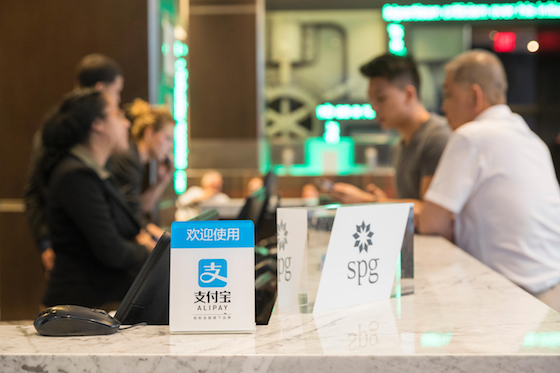As a hotelier, you may have already noticed the influx of Chinese tourists wherever you are – be it a casino in Las Vegas, a grand in London, a chateau in Burgundy, or a boutique in San Francisco. They come for conferences, shopping, sightseeing, wine-tasting, or family-visiting, and you might be surprised that they are even more mobile-tech-savvy than tourists from the developed countries. Today we are going to talk about their secret sauce: Alipay and WeChat.
Dubbed as “Zhifu Bao” and “Wei Xin” in Chinese, almost half of the 1.3 billion Chinese population use one or both of them for payments. Yes, that’s more than 600 million people, twice the size of the United States. In China, people use them to pay for almost everything – utilities, groceries, transportation, food, drinks, clothes, shoes, cosmetics, movies, you name it. In fact, they are also integrated with such functionalities as a mobile investment manager, point-of-sale lender, insurance provider, ride hailer, shopping curator, and most relevant to you – mobile travel agent.

Contributed by Charlie Liu
Alipay was THE inventor of mobile payments in China. As you have probably guessed, “Ali” for “Alibaba”, Alipay was born as the payment solution of Alibaba. Now as part of Ant Financial, the largest fintech unicorn valued at US$150 billion, Alipay has established a vast global network of OTAs and high-end retail merchants. Not only directly integrated with Airbnb, hotel industry’s biggest disruptor, Alipay is also a primary payment method for many large airlines and is trying to provide Chinese tourists with a unified travel experience – from flights to ground transportation, hotels, shopping, dining, and tourist attractions. The goal is to keep the non-English-speaking Chinese tourists on Alipay’s platform throughout the travelling experience, or to maximize its “user-retention”, to put in Silicon Valley’s lingo.
Meanwhile, WeChat, the messaging app with over 1 billion users, of Alibaba’s archrival Tencent, has been trying to leverage its advantage in social network to compete against Alipay in payments. Since 2015, LINQ Hotel in Las Vegas started collaborating with WeChat right before the Consumer Electronics Show (CES), a major hardware tech conference that attracts thousands of Chinese companies and visitors, to allow travelers to check in and control the door-lock and many in-room devices with WeChat. Benefiting from the WeChat experience, LINQ’s parent company Caesars Entertainment in 2017 expanded WeChat acceptance to its other operations on the Strip – including Caesars Palace, The LINQ Promenade, and Paris Las Vegas, for room-booking, food, show tickets, and souvenirs.
Moreover, many international hotels have come to realize the unique proposition of WeChat’s Official Account, which is a super effective branding and direct-marketing channel, and Mini Programs, which provides a powerful H5 interface for immersive and interactive customer experience. Rosewood is one perfect such example who allows followers of its WeChat Official Account to explore and make reservations across their global properties in a frictionless manner.
So, what should you as a hotelier do in order not to miss out on the Alipay/WeChat trend? You certainly have a spectrum of choices. A beginner would be to accept Alipay ad WeChat Pay as payment methods. For example, Luxe Hotel in Los Angeles is the most recent one to adopt this strategy. It normally requires some integration work to your CRM and payment system, but many such service providers now offer the Chinese mobile payment methods as a turn-key solution. The next level would be using WeChat’s Official Account and Mini Program, or to integrate into Alipay’s unified shopper journey. Moreover, there’s much more a hotel can do from the perspective of a tourist’s in-hotel experience.
Major chains like Hilton and Marriott have invested heavily on the Internet of Things to transform the hotel room experience. However, hotels should really think beyond just the in-room experience, but more broadly about the whole end-to-end in-hotel experience. For example, many hotels now offer mobile check-in services to allow customer to pick a favorite room before getting to the hotel, but it still requires a physical check-in at the hotel counter. In China, hotels have started to use artificial intelligence, including facial recognition and motion tracking, to offer an “unattended” experience for check-in and check-out. To be honest, the eCommerce world has embraced this trend for a while, such as Amazon Go and un-manned convenient stores that have bambooed across China.
Indeed, technology has been a heavily invested area by many high-end hotel chains trying to achieve higher level of customization in services. For example, Four Seasons, Marriott, Hyatt, Hilton, and Rosewood are now using cloud-based smart wine-by-the-glass device Plum to provide personalized and value-added services to their VIPs. Since these technologies fall in the expertise of technology giants such as Alibaba/Ant Financial and Tencent, significant synergies seem to be promising between the tech world and the hotel world.
Charlie Liu works as a business analyst for Amsterdam-based tech company Adyen.
